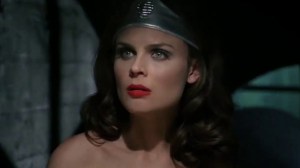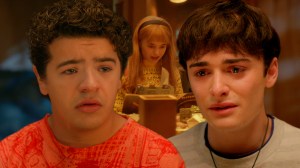The fall blockbuster season gets a star-studded shot of adrenaline this weekend with David O. Russell’s Amsterdam. Russell’s first directorial endeavor since 2015’s Academy Award-nominated Joy was first announced in January 2020, and had acquired the talents of Christian Bale and Margot Robbie shortly after. Acclaimed actors such as Michael B. Jordan and Jamie Foxx were considered for the third lead, but that role ultimately went to John David Washington. As the timeline indicates, production on Amsterdam was heavily delayed due to the COVID-19 pandemic, as the anticipated April 2020 shoot wouldn’t commence until January 2021. These behind-the-scenes shakeups and delays result in an experience that works on paper but fails to accomplish anything more than the sum of its parts.
Videos by ComicBook.com
Set in the 1930s, the duo of Burt (Bale) and Harold (Washington) are caught in the wrong place at the wrong time, as they witness a murder and are deemed suspects themselves. This takes the pair on a journey that reunites them with an old friend (Robbie), helping form new bonds, and all the while unravels a dark conspiracy. As the film’s tagline promises, “a lot” of what’s depicted on screen actually happened in American history.
Unfortunately for Amsterdam, the tagline is just about the only promise it delivers on.
Amsterdam struggles with an identity crisis. The film is far from the tense murder mystery that trailers tease, as it rather feels more like a day in the life adventure of Burt, Harold, and Valerie instead. That’s because, aside from the brief seconds following the murder and a somewhat intriguing climactic ending, tension is all but non-existent throughout the film.
Much of that is due to a messy structure, which could have the pandemic to blame. Numerous scenes include medium close-ups of a singular character, indicating that the actor in frame was the only one on set at the time, and the conversation they’re having was spliced together with some movie magic.
A good portion of the second act is exposition which ultimately derails Amsterdam‘s pacing to the point that it never gets back on track. That extended flashback is also done with the purpose of selling the bond between the three leads. This can be viewed as a necessary evil, as Burt, Harold, and Valerie’s friendship and the circumstances around it do factor into the film’s overall plot, but it can also be seen as what it is on a surface level: boring.
That disinterest boils down to the chemistry, or lack thereof, between Washington’s Harold and Robbie’s Valerie. These two characters are supposed to be long-lost lovers with an integral bond to the overarching narrative. When that relationship falls flat, intrigue in the film’s storyline is lost. This could be in part to Washington being a late addition, as originally the aforementioned Jordan was signed on to fulfill that role. Washington and Robbie are only one pair of interweaving performances, but the inauthenticity of it will make viewers see the two as the real-life actors rather than the characters they are playing.
Washington and Robbie aren’t the only two that fall into that trap either. Numerous other supporting stars like Taylor Swift and Chris Rock come off as themselves much more than their respective roles. That said, Rock brings a much-needed energy boost whenever he is on screen, and Swift holds her own opposite the A-List acting talent that she shares the stage with.
Stage is correct as well, as some of the earliest scenes come off as a play-like performance. From the blocking to the way characters enter and exit the frame, a good portion of act one operates like a Broadway show. This gives the film that retro feel it’s seeking for throughout, but the aforementioned exposition takes it away shortly after.
Another stage performance aspect comes in the dialogue. While it’s unclear if this was intentional, many lines felt improvised, which acts as both a strength and a weakness. As expected with an ensemble of varying levels of experience, some execute these seemingly improvised conversations with ease while others are exposed by them.
No one does those exchanges better than Bale. In a film riddled with pacing problems and subpar storytelling, Bale is completely committed to his role. The role of Burt requires Bale to sell some physical disabilities which he pulls off flawlessly. His physical acting mixed with his facial expressions make Burt one of the few authentic characters in Amsterdam.
Robert De Niro appears as General Gil Dillenbeck, a casting choice that was appreciated due to the character’s importance. Bringing in a big-name veteran actor like De Niro allows the audience to understand the weight of Dillenbeck without needing extended exposition. Just like how decorated actors like Benedict Cumberbatch and Richard Madden show face in 1917 to give their limited roles an immediate boost of significance, De Niro’s Dillenbeck is understood to be a crucial character just by the fact that De Niro is playing him.
Aside from a good day at the office for Bale, there’s not much to love from Amsterdam. It’s ultimately a waste of one of the most impressive ensembles in recent memory, and markets itself as far more interesting than it actually is.
Rating: 2.5 out of 5
Amsterdam hits theaters on Friday, October 7th.








